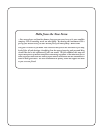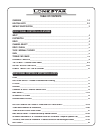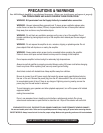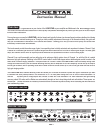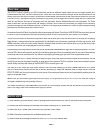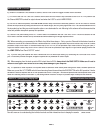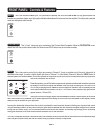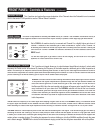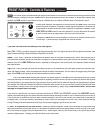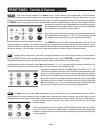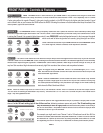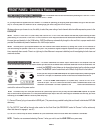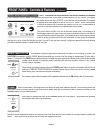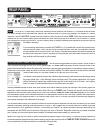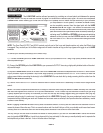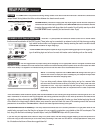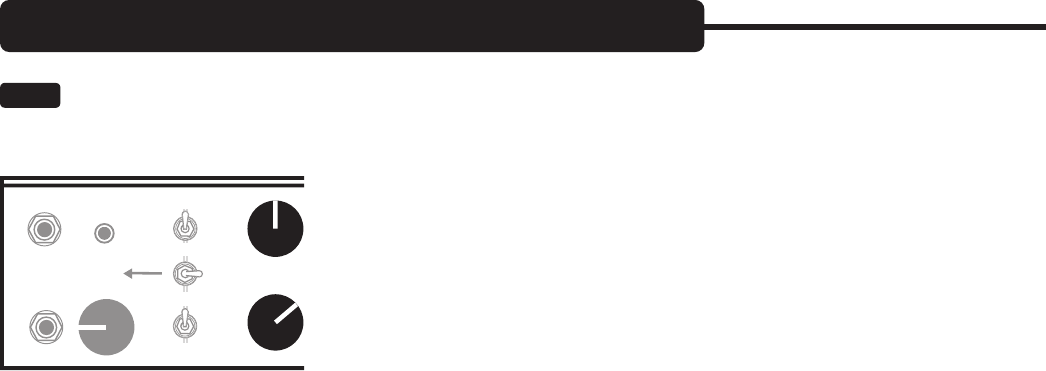
PAGE 6
FRONT PANEL: Controls & Features
(Continued)
GAIN:
This control adjusts the predominant gain stage in each channel’s circuit with the function and taper being optimized for each
individual channel. Remember that your
LONE STAR
is really two amplifi ers built onto one chassis, so though each channel looks
identical, the
GAIN
control for each channel comes in a different place and adjusts a different point in that channel’s circuit.
In most guitar amplifi ers, and especially in all-tube circuits, the
GAIN
control is the most
powerful control in the preamp. It shapes the overall style and character of the sound and
is responsible for whether the sound is clean, overdriven or anywhere in between. In your
LONE STAR
the
GAIN
control is even more powerful. It not only determines the amount
of drive, but also acts as an integral part of the tone control string as well.
To simplify the
GAIN
controls’ role in shaping the overall tone of the sound we will look at
it in two ways -
1)
alone and
2)
in conjunction with the tone controls.
1) By itself the GAIN control has basically three tonal regions -
Low ( 7:00 - 11:00 )
provides the cleanest, least saturated sounds and in this region the sound will be brighter and contain more
upper harmonics lending a three dimensional character to the sound.
Middle ( 11:15 - 2:00 )
enhances the saturation and replaces some of the upper harmonics with a richer, warmer quality and a
fuller bottom end response. Not yet fully saturated, this region is the easiest place to get a great sound in both channels. This region
contains many of the
LONE STAR’s
best sounds...especially for soloing due to the crucial blend of an expressive attack combined
with ample sustain.
High ( 2:15 - 5:00 )
saturates the signal and enhances low and low mid frequencies. While this region provides the maximum satu-
ration and therefor sustain, it also compresses and softens the attack characteristics. For this reason we suggest using this higher
region of the
GAIN
control sparingly and only when maximum sustain is needed.
NOTE:
NOTE: NOTE:
Due to the
LONE STAR’s
extreme gain potential, the highest regions of the
GAIN
control may possibly push the pre-amp
tubes past what they can handle, producing microphonic squealing. While we screen and test the tubes your amplifi er was shipped
with and the tubes in your amp passed our rigourous test, we can’t predict how the tubes will respond over time exposed to extreme
gain settings. Your tubes are warranted for a period of 6 months under normal use, but you can save yourself the present and future
inconvenience of having to deal with annoying microphonic tube problems by simply using
a little common sense...Use the Gain
sparingly at the higher end of its range!
If you must for a specifi c part or at very low volumes, back down the TREBLE and PRESENCE controls. The
LONE STAR
was de-
signed to provide amazing gain and tone at less than extreme settings removing the need for you to crank everything all the way up.
If you are not able to achieve the sound you want at sensible settings on any or all of the controls, your problem may lie elsewhere in
the signal chain, i.e. pick-ups, cabinetry, processing etc. Keep in mind you can always call on one of our product specialist Monday
through Thursday and seek some advice should you fi nd yourself struggling to get the sound you want.
2.) GAIN - In conjunction with the Tone Controls -
Basically, a simple rule applies...as the Gain is increased the Tone control string
has less and less effect on the signal until at 5:00 the signal is so saturated that you are
getting mostly Gain and very little Tone
. Again,
this is the reason we suggest using the
GAIN
control in its middle region. Here the Tone control string is very active and provides
maximum shaping power - allowing you to dial virtually any sound you desire.
INPUT
FT.SW
DRIVE
CH 1
FT SW
CH 2
THICK
THICKER
CLEAN
MAL
GAIN
NOR



